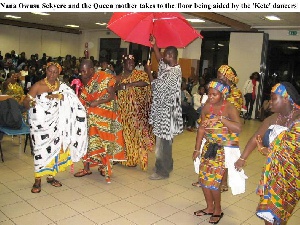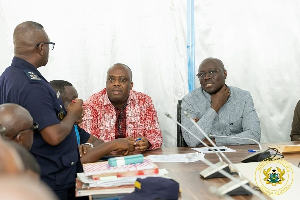...Puts Ghana’s Culture On Show
Ghanaians in Reggio Emilia, Italy, organised one of the biggest youths events ever seen in the city.
Under the headlines: ‘THE FIRST YOUTH DAY FIESTA’ the occasion was expected to revolve around speeches, counselling, music and some sort of refreshments but it went further than that. Gospel music, speeches, counselling, talents shows, a traditional durbar of the chief and people in Ghana, modelling in Ghanaian cultural clothes, story telling and jokes, refreshment, all rolled into one went into the event which characterised it as the greatest youths event by foreign nationals in the city.
Organised under the auspices of the Ghana Association in Reggio Emilia, an estimated number of 250 Ghanaian youths and parents, foreign nationals, the Italian local press were in the main Hall of Don Bosco, few kilometres from the city centre, to witness the event.
Special guest of honor was Ghana’s new Ambassador to Italy, His Excellency Charles Agyei-Amoama. He did not stay for long at the function as he has to attend another engagement being organised by the Ghanaian community in Brescia, 100 km away.
But the Honorable Statesman and his entourage may regret not seeing the events that followed their departure. He has earlier called on the Ghanaian youths to retain and maintain the Ghanaian culture saying culture gives people their identity.
“ Your country must not be forced on anyone abroad rather should come naturally with pride. You must be good Ambassadors of Ghana and be prepared to trade Ghanaian culture with loyalty, dedication and zeal, this way you will grow and take the rightful place in the society,” he told them.
He also urged the youths to integrate into the Italian society putting it that they can do that by adopting the Italian culture but he asked them to observe the good and the bad side of their culture and take the good ones.
The President of the of the Association, Hastings Osei Anokye, in his opening remarks extended a warm welcome to the Ambassador, Presidents of the various Associations, Pastors, elders of the various churches and to all the participants.
He pointed out that the new Executive Board of the Reggio Emilia Association was sworn in barely a year ago and among the aims they lined up was to bring many Ghanaians as possible like a big family, to use every communication tool to educate and inform all Ghanaians on the legal and current affairs both in the city and from Ghana and to create a website. He also indicated the intention of the Executives was to lead the Ghanaian community to respect the moral and civil values of the society they live mentioning also there was the objective to form a cultural heritage group which will expose Ghana’s culture.
Hastings Osei Anokye noted there was the idea to organise programs like talent shows and English lessons for the youths.
Most of these objectives according to him have been achieved and the Association can now boast of a website, www.gna web.it where all of its’ information could be obtained.
The President again stated that the youths of today have many fears in the society they live and they need help and guidance through these rough times. Some of these fears he noted is the worry to make it in life financially, how to get a good education, worry over parents divorce and inability to find time to do everything.
He said: “One of the key reasons youths are so busy is that they have so many choices. They have more choices in sports, more choices in recreation, more choices in schools and even more choices in church but they show little discernment in making these choices often refusing to say ‘no’ to any option. The result is frustration and sometimes they are burnt out.”
Hastings Osei Anokye told the parents they cannot leave the youths to be taught only academically at school or be taught some good manners in the church but they have to train and instruct them since charity begins at home. He concluded his address saying: “The time has come for us to join hands as a big family even though we come from different background. I urge you all Ghanaian groups in and around the country to get into the ARK in organising our youths for the better.”
Other speakers were Pastor Charles Owusu Afram of the Latter Glory Ministries International and Pastor Noble Asante, Assemblies of God Church in Reggio Emilia.
Rev. Curtis Redmond based in New York, a close associate of Pastor Owusu Afram who accompanied him to the function had moments to make some contributions. He told the gathering he’s thrilled whenever in the midst of the Ghanaian community in New York and is happy to witness the event. He said people can have unity through diversity and is good to encourage the youths to know their history.
“It’s important the young people know about their history and recite it. The church is also an important place that the culture of Ghana can be exercised,” noted the Rev. Minister. He caused laughter and applause revealing that his favorite Ghanaian dish is the local ‘banku’ (cooked corn dough) and stew.
With speeches, counselling, questions and answers over the stage was set for other remarkable events.
Samule Offei, an IT expert, gave an account of the life history of Ghana’s first President, Dr. Osagyefo Kwame Nkrumah. Clad in Ghana traditional ‘kente’ cloth and white top the young man choice of words, voice and action was a complete carbon copy of the late Ghanaian President and had he hidden himself behind a screen he could have been taken for Dr. Nkrumah for real. When he imitated the former Ghanaian leader on the day of Independence with these words, “the independence of Ghana is meaningless unless it is linked with the total liberation of the African continent” participants could only watch in amazement of his creative performance.
Then came Wendy Walker, cutely dressed and spotless, she has beauty and enough of it. She provided the audience with the geography and history of Ghana – position, population, tribes, minerals, official language, costume, food, flag colors, the currency and the current state of the economy.
These events has earlier been proceeded by drumming and dancing as a mock durbar of the chiefs and people in the Ashanti Region of Ghana were ushered in. The Chief, Nana Owusu Sekyere, sat in state and took some of the moments to dance with ‘kete’ and ‘adowa’ dancers - two of Ghana traditional dances.
The local press didn’t want to miss any of the entertaining moments flashing their cameras to capture every scene of the occasion. It was awesome and as I sat taking keen interest and soaking myself in the excitements one of the organisers quipped in my ears, “this is Reggio Emilia.” I understood him but didn’t have the faintest idea as many as 2,500 Ghanaians live in the city -the fourth most populated Ghanaian community in Italian cities after Brescia, Vicenza and Modena - and it’s also a city noted for the world’s most famous kindergarten.
On gospel music, Florence Eshun exhibited a kind of performance that can melt any hardened heart. Her two songs ecstatically took people off their seats in dancing and joy, also came the dancing show from three groups with these youths putting up an incredible treat, their quick twists and turns could be envied by even professionals in the field.
One other event that added extra color to the occasion was the fashion show where the youths displayed various designs and cuts of Ghana traditional wears. The man noted for his funny jokes and story telling, Charles Obeng, -alias ‘water ho -had his brief moments, his one joke comparing a nude woman to a dressed chicken would not go down well with most women but it sent the entire audience roaring with laughter.
The Ghanaian community in Reggie Emilia marketed Ghana and for the foreign nationals present it was an occasion to know something about the country and they had it complete, for the Ghanaian youths absolutely nowhere in the world when Ghana obtained independence it was like going back to the roots and they also saw what are the cultural values of their country.
Diaspora News of Thursday, 14 December 2006
Source: Reggie Tagoe in Reggio Emilia, north of Italy













